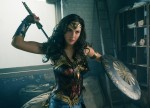Wonder Woman shattered the comic book glass ceiling when she first burst onto stands in 1941. In 2017, she does so again as the first woman to front a superhero movie in a new wave of DC and Marvel films.
“Wonder Woman” is everything a superhero movie should be – the film is populated with engaging, dynamic characters and a strong thematic narrative about the horrors of war.
Unlike some of its DC predecessors, such as “Batman v Superman: Dawn of Justice,” the film accomplishes a cinematic feat without taking itself too seriously, leveraging comedic moments and lively action sequences to create a film that allows its heroine to be naive, funny and conflicted all at once.
The film centers on Diana (Gal Gadot), an Amazonian princess of the all-female warrior superhumans. The Amazons’ self-imposed isolation is brought to an end by U.S. pilot and spy Steve Trevor (Chris Pine), who brings news of the ongoing World War I that rages outside the protection of the island Themyscira. Determined to save humankind, Diana departs her home to end the war by finding and killing the mythological god Ares, whom she believes is responsible for the death and destruction.
Patty Jenkins is the first woman to direct a superhero movie for a major studio, and her finesse as a filmmaker comes across in the film’s careful balancing act of earnest epic quality and unabashed fun. The success of the film rests squarely on the compassionate and complex characterization of Diana, who spends the film struggling to understand conflicting humans she feels compelled to protect.
Diana’s fluid fighting style is mesmerizing to watch, making it hard not to applaud after each of her action sequences. During a battle against the Germans, she climbs out of the grim trenches of the front line, effortlessly crossing the German lines and deflecting bullets with her armored cuffs with a determined serenity.
Diana’s belief that she can single-handedly save the world is equal parts noble and unsuspecting – she has a childlike faith that is utterly compelling.
Her naivete leads to many comedic moments. She wonders if corsets are England’s form of armor and attempts to walk through a revolving door while wielding her signature sword and shield.
Gadot imbues Diana with a sense of awe. Diana walks down the bustling streets of London, and the joy on her face as she surveys humanity for the first time is magical. Diana’s unvarnished idealism is a refreshing take on superhumans that is often missing from superhero films.
Part of what makes the film so engaging is the crackling chemistry between Gadot and Pine. Steve’s weary realism, brought on by his experiences in the war, contrasts Diana’s optimism. The vocally sparring partners are excellent foils to one another.
Pine’s character is charming, courageous and capable, and perhaps almost as groundbreaking as Gadot’s, as he serves as one of the first mortal male love interests in a superhero movie. He never questions Diana’s abilities because she is a woman or undercuts her agency.
He instinctively tells her to step back for her own protection as German agents fire a bullet when they’re cornered in an alleyway. When she jumps in front of him and deflects the bullet with her armor, he looks on in amazement and stays put so she can take the villains down.
The film explores the shades of morality and tackles grander thematic questions about the goodness of humankind. Diana emerges from Themyscira believing human warfare to be merely a product of Ares’s meddling, but slowly comes to question her own moral convictions while witnessing the horrors of battle.
As Diana watches the destruction of a town full of innocent people, the pain in her eyes haunts in a way that conveys both the realities of war and a dimension missing from her superhero predecessors – respect and understanding for the loss of human life.
“Wonder Woman” is the rare superhero movie that succeeds in making sure the audience acutely feels every injury and death inflicted onscreen.
Although many have placed extra scrutiny on “Wonder Woman” because of the fact that it is a female-fronted superhero film, the film stands on its own regardless of gender. The film provokes thoughts about mortality and humankind’s legacy, while entertaining with gorgeously choreographed action sequences.
Wonder Woman is a timeless feminist icon and now, just over 75 years after her first comic book appearance, the Amazonian princess finally has a movie adaptation worthy of her legacy.
